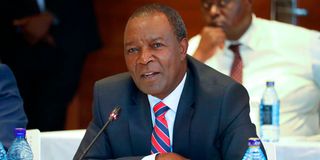Give Treasury autonomy, CRA urges senators

National Treasury Cabinet Secretary Njuguna Ndung’u when he appeared before the Budget and Appropriations Committee on February 13, 2023.
The Commission on Revenue Allocation (CRA) has called for the National Treasury to be transformed into an independent office to ensure impartiality in its service delivery to both levels of government.
According to the CRA, the Treasury currently operates predominantly as an arm of the national government and not as a service provider for all levels of government.
Appearing before the Senate Finance and Budget Committee yesterday, the Director of Economic Affairs at CRA, Lineth Oyugi, noted that this situation had resulted in the National Treasury showing preference towards ministries, departments, and agencies, at the expense of county governments, during the allocation of national resources.
She said prioritising disbursements to the national government had resulted in county governments not receiving their allocations for the last three months, which has led to county staff going without salaries.
She added that the National Treasury has been using “financial constraints” as an excuse to deny the devolved units funds.
Ms Oyugi proposed that to address this “unjust treatment” of county governments, the National Treasury should be transformed into an independent office, similar to the Auditor General’s and Controller of Budget’s offices. “We cannot continue having a National Treasury that acts as an agency of the national government at the expense of counties. KRA raises money on behalf of the entire government, and not only the national government,” said Ms Oyugi.
She noted that prior to the adoption of the 2010 Constitution, the National Treasury was a department under the Ministry of Finance. However, the situation has since changed.
She said Article 225(1) of the Constitution stipulates that an Act of Parliament should be enacted to establish the National Treasury, define its functions, and set out its responsibilities.
Further, Article 225(2) states that Parliament shall enact legislation to ensure both expenditure control and transparency in all governments and establish mechanisms to ensure their implementation.
Parliament erred
Ms Oyugi pointed out that in actualising Article 225(1) through the Public Finance Management (PFM) Act, Parliament erred by including Section 11 of the PFM Act, which establishes the National Treasury as an entity of the national government. She said this contradicts the Constitution, as the National Treasury should be an office serving all levels of government, not just the national government.
“Article 225 of the Constitution did not envisage the Treasury to be an agency of the national government but a Treasury of all governments. We cannot have a Treasury prioritising giving national government money and not the counties. If it was neutral, it would be giving the little money equally to the two levels,” she said.
Consequently, she said, Parliament should amend Section 11 of the PFM Act to ensure that it aligns with the Constitution and the type of National Treasury that was envisioned.
The National Treasury currently has outstanding disbursements amounting to at least Sh92 billion owed to the counties for the months of January, February, and March.
Appearing before the same committee on Wednesday, Treasury CS Njuguna Ndung’u said the government is facing a financial crisis with no additional funds to disburse. He pleaded with the counties to accept the Sh385 billion that had been allocated to them as their equitable share of the revenue.
He said the national government is experiencing financial difficulties due to a combination of reduced revenues and limited access to financing, owing to the narrowing borrowing headroom.
However, CRA rejected the proposal to allocate Sh385 billion as the equitable share for the fiscal year ending in June 2024, sticking to its initial proposal of allocating Sh407 billion.
Ms Oyugi said that since Article 202(1) stipulates that the nationally raised revenue shall be shared equitably between the national and county governments, counties should get Sh37 billion more with the projected revenue growth of Sh55 billion expected in the next fiscal year.





